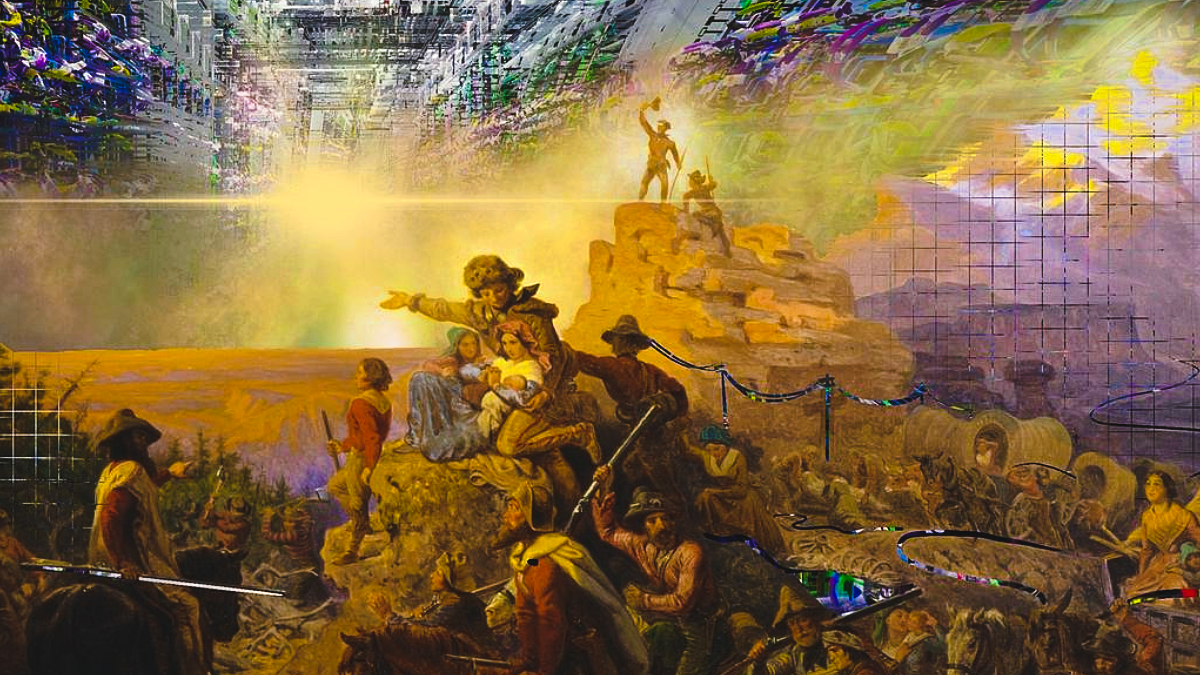Thirty Years On, the Californian Ideology is Alive and Well
Nathan Schneider / Aug 29, 2025
Frontier Models 3 by Hanna Barakat & Archival Images of AI + AIxDESIGN / Better Images of AI / CC by 4.0
In August 1995, Newt Gingrich appeared on the cover of Wired. It would have seemed, for some, inexplicable that the Speaker of the House and standard-bearer of movement conservatism had his face on the vanguard organ of the forward-looking, West Coast, T-shirts-and-flip-flops personal personal computer industry. The surprise must have rhymed—again, for some—with the scene earlier this year of tech CEOs dutifully standing behind Donald Trump at his inauguration.
Any such surprise can be put to rest by revisiting an essay by a pair of British media scholars, Richard Barbrook and Andy Cameron: “The Californian Ideology.” Thirty years ago this week, it came out in Mute magazine and circulated on the early-adopter email list nettime. The essay described (and rhetorically, at least, demolished) the unspoken consensus that seemed ascendent in the US tech industry at the time. They said the quiet part out loud: the industry had combined countercultural chic with a sort of authoritarian capitalism determined to root out collective power wherever it appeared, all while talking the talk of democracy.
When you put all your faith in technological progress and the Ouija board of market forces, as Barbrook and Cameron put it, “social and political debates about the future have now become meaningless.” Democracy has no air left to breathe. Individuals can choose products, and companies can choose to produce them. But collectively, as a society, we are at the mercy of whatever innovations the market sees fit to deliver; that is the future, full stop.
The part of the essay that really rankled the Californians on nettime, Barbrook told me in an interview a few years ago, had to do with the early Internet advocates’ promise of a “Jeffersonian democracy.” In the 1990s, apparently, it was still impolite to remember that Thomas Jefferson was a slaveholder, and his vision of democracy was one for an enlightened, aristocratic elite living on the backs of a vast underclass. Two centuries later, a computer-savvy “virtual class” was positioning itself to become a new aristocracy—not through enslaved labor but free-flowing information. If information could be free, perhaps the humans locked in corporate jobs wouldn’t have to be.
It seemed for a while like the Californian ideology was in retreat. During the last Trump administration, Silicon Valley tech workers were in open revolt, staging walkouts and forming unions. They forced their employers to abandon lucrative contracts to build tools for surveillance, militaries, and immigration enforcement. The “trust and safety” teams were influential at social media companies. When COVID hit, Big Tech went remote and provided the tools for other workers to join them. The Valley seemed synonymous with the Resistance. If you didn’t like the new Californian consensus, you’d have to follow Elon Musk to Texas.
In 2025, the Californian Ideology returned, if it ever really left. (Part of its charm, after all, is the ability to wear countercultural disguises.) AI companies declared a new era of disrupting everything, which could result in paradise or cataclysm—we’ll have to see which. CEOs laid off their trust and safety teams en masse, first at Twitter and then most everywhere else. Competition with China justified a hearty embrace of military contracts, and labor unrest cowered as AI began threatening jobs by writing code.
Nobody represents this turn better than the venture capitalist Marc Andreessen. Before Trump’s return, in his “Techno-Optimist Manifesto,” Andreessen reveled in “the techno-capital machine of markets and innovation” that “spirals continuously upward.” He was dismayed as employees in his portfolio companies raised questions about the effects of their products on society and the environment, and even called into question the for-profit corporation itself.
Andreessen told the New York Times’s Ross Douthat, with not a hint of irony, “The Californian ideology was real and correct, and the Valley had always incarnated a specific version of that.”
He wanted it back. He wanted capitalism to be capitalist again. And so, despite being a longtime supporter of the Democratic party, he went all in for Trump. (All In, incidentally, is also the name of a tech-investor podcast that provides Californian takes in real time.)
In many areas of life now, technology has become a replacement for political debate and policymaking. It is enabled by what I call “innovation amnesia”—the tendency to forget past social arrangements when new tech comes along to undermine them. Instead of building decent public transit, we revel in ridesharing apps that break labor laws and clog city streets. Instead of regulating banks and taxing the rich, we turn to cryptocurrencies that make both things even harder. Instead of modernizing antitrust law, we admire Amazon for making its monopoly powers so efficient and convenient.
Barbrook and Cameron insisted that there are other ways to build technology, and to do it democratically. They pointed to the example of Minitel, the computer network developed and managed by the French government starting in the 1980s. It provided free terminals and hosted what would now be called an app store—all under the auspices of a democratic institution, not a for-profit one. A territorial government might not be the correct eternal steward of a global network, of course. But that example points to what it might have been like if the reigning ideology of the Internet had been democratic governance, not the corporate marketplace.
It might be worth revisiting, also, the Jeffersonian legacy in this age of AI. A decade ago, I reported on a growing attraction in Silicon Valley to the idea of universal basic income; since job-snatching machines were coming, the logic went, a radical rethinking of the social order would be needed for people to meet their needs—and maybe even enjoy their lives more.
Now the AI craze is here, though, and the tech-backed Trump administration is eviscerating the US safety net. Sam Altman’s eyeball-scanning UBI startup may be the closest thing we have to a new order. The mood in Washington is positively Californian: Let’s just see where the tech and the market lead us.
When I spoke with Barbrook a few years ago, he was happy to celebrate the fame his essay had achieved but was under no illusions that an essay is enough. “We can mock this hypocrisy and publish detailed exposés of its cynical reasoning,” he said, “but our clever words are not subversive deeds.”
Authors
